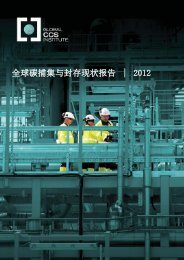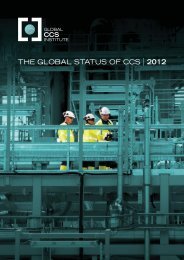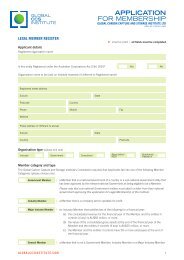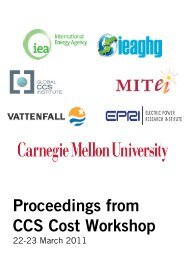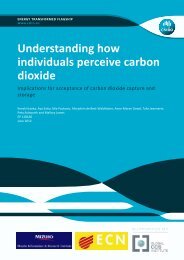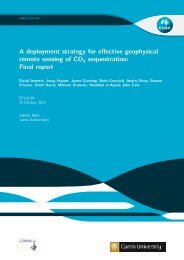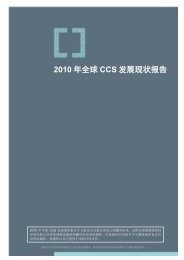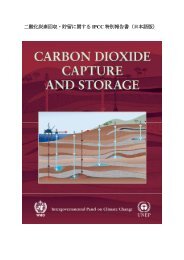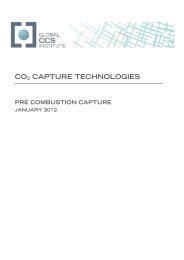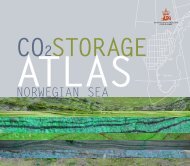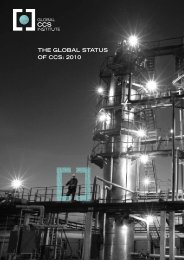Download the report - Global CCS Institute
Download the report - Global CCS Institute
Download the report - Global CCS Institute
Create successful ePaper yourself
Turn your PDF publications into a flip-book with our unique Google optimized e-Paper software.
2CHAPTERWhat happenedin Rotterdam?The companies Gasunie and VOPAK conducted a feasibility study fordeveloping a distribution hub for handling and temporary storage of CO 2.Part of that work was co financed by <strong>Global</strong> <strong>CCS</strong> <strong>Institute</strong>. The result was anew <strong>report</strong> on <strong>the</strong> business case of <strong>the</strong> Hub and <strong>the</strong> launch of a new servicecompany with <strong>the</strong> name CINTRA in <strong>the</strong> second half of 2010. The partners of<strong>the</strong> ROAD project prepared for <strong>the</strong> FID (including execution of <strong>the</strong> FEED studyand negotiations on storage), now scheduled at <strong>the</strong> end of 2011.The time between conception of <strong>the</strong> NER300 and <strong>the</strong> final decision for <strong>the</strong>NER300 is relatively long. RCI was involved in this preparation process asfocal point for <strong>the</strong> Rotterdam industry. The national government organizes abriefing for stakeholders who wish to submit applications for NER300 in July2010. In this meeting <strong>the</strong> criteria for <strong>the</strong> pre-selection by national governmentsare discussed (criteria that do not seem positive for Rotterdam basedcompanies because <strong>the</strong>y directly or indirectly lead to a preference of projectsfrom o<strong>the</strong>r locations). Finally <strong>the</strong> European Commission decided in November2010 to go ahead and publish <strong>the</strong> subsidy regulation. Due to <strong>the</strong>advocacy of RCI and Rotterdam based companies <strong>the</strong> Dutch criteria weremore neutral to location. Late 2010 and early 2011 RCI was completelydedicated to supporting companies who wish to apply for a grant in <strong>the</strong>NER300 procedure. RCI also tried to achieve one joint proposal fromRotterdam based companies. At <strong>the</strong> end on 9 February 2011, four proposalswere submitted to <strong>the</strong> national government of <strong>the</strong> Ne<strong>the</strong>rlands of which twoin Rotterdam area: (i) <strong>the</strong> Green Hydrogen project led by Air Liquide and (ii)<strong>the</strong> Pegasus project led by SEQ International. National government assessed<strong>the</strong>se four projects and decided to only pass one project to <strong>the</strong> Europeanassessment part: <strong>the</strong> Green Hydrogen project. Decisions about <strong>the</strong> NER300are expected in Q1 of 2012.RCI strategy and <strong>report</strong>s – In <strong>the</strong> beginning of this period, <strong>the</strong> RCI <strong>CCS</strong>Plan 2010-2011 is drawn up. In this plan <strong>the</strong> Port Authority states that ithas <strong>the</strong> ambition to develop <strong>the</strong> port area to become <strong>the</strong> CO 2hub of North-West Europe. The cooperation between RCI and <strong>Global</strong> <strong>CCS</strong> <strong>Institute</strong> startedearly 2010 and results in three research projects being co financed by <strong>the</strong><strong>Global</strong> <strong>CCS</strong> <strong>Institute</strong>: (i) an Independent Storage Assessment (ISA), (ii) <strong>the</strong>Liquid Logistics Shipping Concept (see above on Hub and CINTRA) and (iii)<strong>the</strong> Case Study on Lessons Learnt (current <strong>report</strong> is one of <strong>the</strong> deliverables ofthis project). The ISA is a detailed analysis of <strong>the</strong> storage locations. ISA ismeant to reduce uncertainties by determining for each potential storage sitewhe<strong>the</strong>r CO 2can be stored and what <strong>the</strong> storage capacity and injectivitycould be. In September 2010 RCI publishes <strong>the</strong> 2010 <strong>CCS</strong> <strong>report</strong>, this timefocused on politicians, administrators and senior officials. The <strong>report</strong>identifies <strong>the</strong> strengths of <strong>the</strong> Rotterdam <strong>CCS</strong> activities: <strong>the</strong> networkapproach, <strong>the</strong> commitment of <strong>the</strong> companies and <strong>the</strong> involvement ofindustry in addition to <strong>the</strong> electricity sector. O<strong>the</strong>r studies of <strong>the</strong> RCI in thisperiod are:• The Economic Impact Assessment, a study on <strong>the</strong> likely additionaleconomic benefits of <strong>the</strong> investments in <strong>CCS</strong> projects in Rotterdam• The Strategic Environment Management study (SOM, acronym in Dutch),an assessment of <strong>the</strong> position of relevant parties in and around <strong>the</strong> portarea with regard to <strong>CCS</strong> projects and <strong>the</strong> related infrastructure• A safety study on CO 2infrastructure by DNV17




